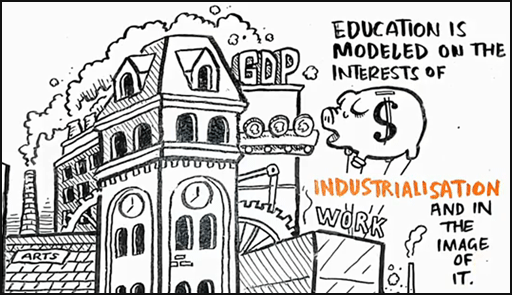Changing Education Paradigms is a lecture delivered by Sir Ken Robinson. We were asked to watch it and explain how we felt about the arguments made in the video and whether we agreed with them or not.
Unlike in the past, having studied a degree does not always imply that the student will get a job at the end of his formation. By using the same models of education that were created as a result of the Industrial Revolution (back in the 18th – 19thcentury) millions of kids are being alienated everyday at their school.
In an era in which they have everything to enjoy what they’re doing these children just don’t get the point in attending lessons that they find boring. I didn’t know that so many kids were medicated to keep them focused. I completely agree with Sir Ken Robinson when he says that it’s not that children are distracted by lots of things (such as videogames, TV, the internet, etc) but that the way they are being taught at school must change and adapt to make things entertaining and interesting for them. In my opinion he’s completely right when he says that arts are the main victims of the educational system.
Finally, I find curious that in the video it’s said that the creation of the current educational system was “driven by economic imperatives of that time” and at the same time it was previously stated that one of the reasons for the reforming of that same system today is also economic. If the birth of this also gave place to the formation of the intellectual model of the mind applied since then, maybe a change in the paradigm could create a new model that could allow education to let behind the distinction between academic and non-academic.
The changes that he proposes are, I suppose, difficult to apply to our current educational system but even so, at least from my point of view, they are needed.
*****
 Since the structures that are used still today were created centuries ago, it is logical that they are obsolete and cannot be applied anymore (in fact they shouldn’t have been applied for some decades now). The fact that, as Sir Ken Robinson says, many countries in the world are nowadays reforming their public education systems is the first step to accommodate the needs of current generations, but governments are not taking the correct road in this matter.
Since the structures that are used still today were created centuries ago, it is logical that they are obsolete and cannot be applied anymore (in fact they shouldn’t have been applied for some decades now). The fact that, as Sir Ken Robinson says, many countries in the world are nowadays reforming their public education systems is the first step to accommodate the needs of current generations, but governments are not taking the correct road in this matter.
 Since the structures that are used still today were created centuries ago, it is logical that they are obsolete and cannot be applied anymore (in fact they shouldn’t have been applied for some decades now). The fact that, as Sir Ken Robinson says, many countries in the world are nowadays reforming their public education systems is the first step to accommodate the needs of current generations, but governments are not taking the correct road in this matter.
Since the structures that are used still today were created centuries ago, it is logical that they are obsolete and cannot be applied anymore (in fact they shouldn’t have been applied for some decades now). The fact that, as Sir Ken Robinson says, many countries in the world are nowadays reforming their public education systems is the first step to accommodate the needs of current generations, but governments are not taking the correct road in this matter.Unlike in the past, having studied a degree does not always imply that the student will get a job at the end of his formation. By using the same models of education that were created as a result of the Industrial Revolution (back in the 18th – 19thcentury) millions of kids are being alienated everyday at their school.
In an era in which they have everything to enjoy what they’re doing these children just don’t get the point in attending lessons that they find boring. I didn’t know that so many kids were medicated to keep them focused. I completely agree with Sir Ken Robinson when he says that it’s not that children are distracted by lots of things (such as videogames, TV, the internet, etc) but that the way they are being taught at school must change and adapt to make things entertaining and interesting for them. In my opinion he’s completely right when he says that arts are the main victims of the educational system.
Finally, I find curious that in the video it’s said that the creation of the current educational system was “driven by economic imperatives of that time” and at the same time it was previously stated that one of the reasons for the reforming of that same system today is also economic. If the birth of this also gave place to the formation of the intellectual model of the mind applied since then, maybe a change in the paradigm could create a new model that could allow education to let behind the distinction between academic and non-academic.
The changes that he proposes are, I suppose, difficult to apply to our current educational system but even so, at least from my point of view, they are needed.
No comments:
Post a Comment